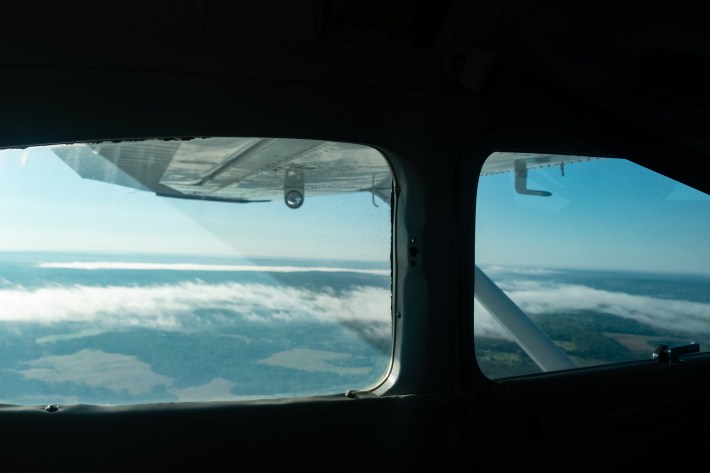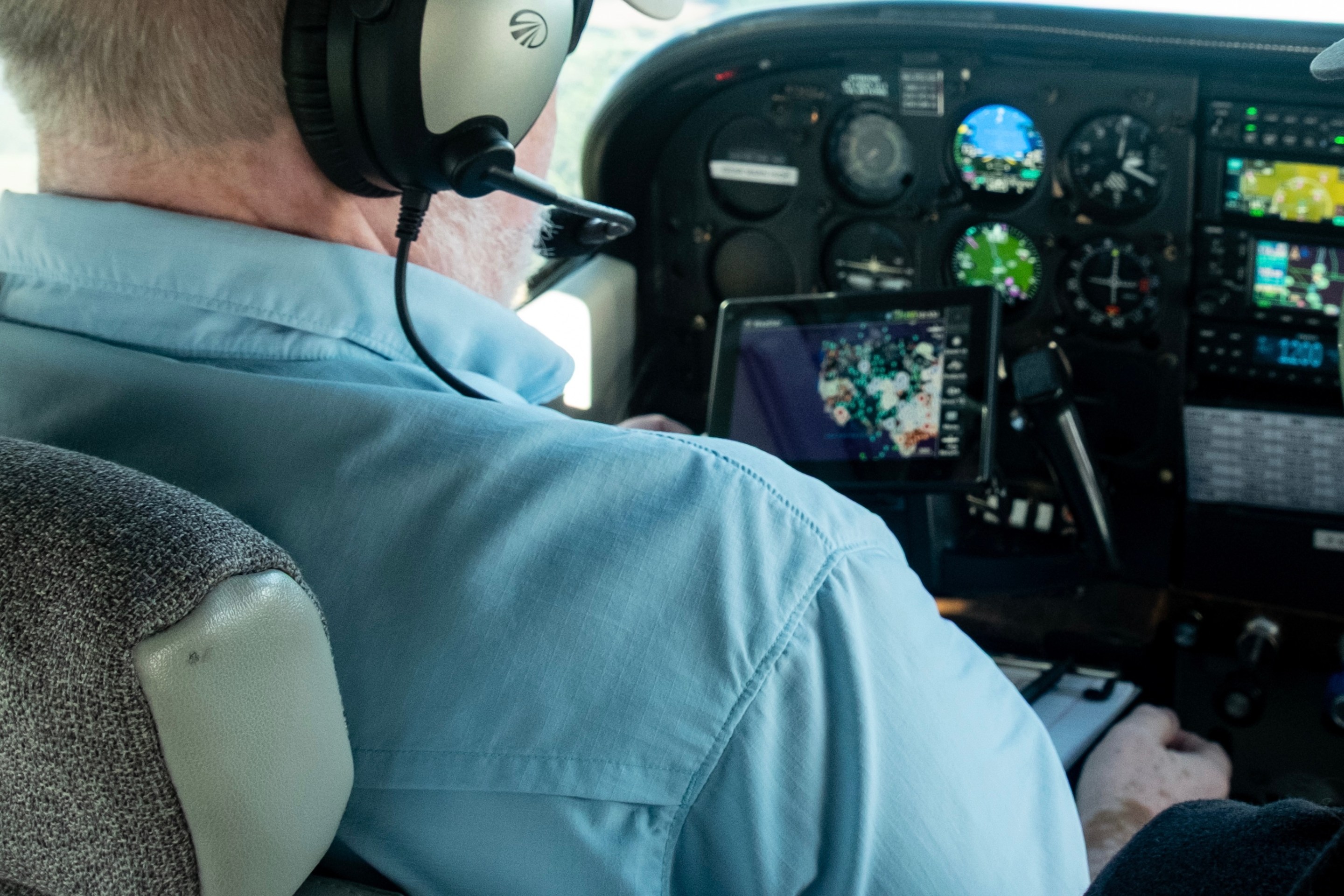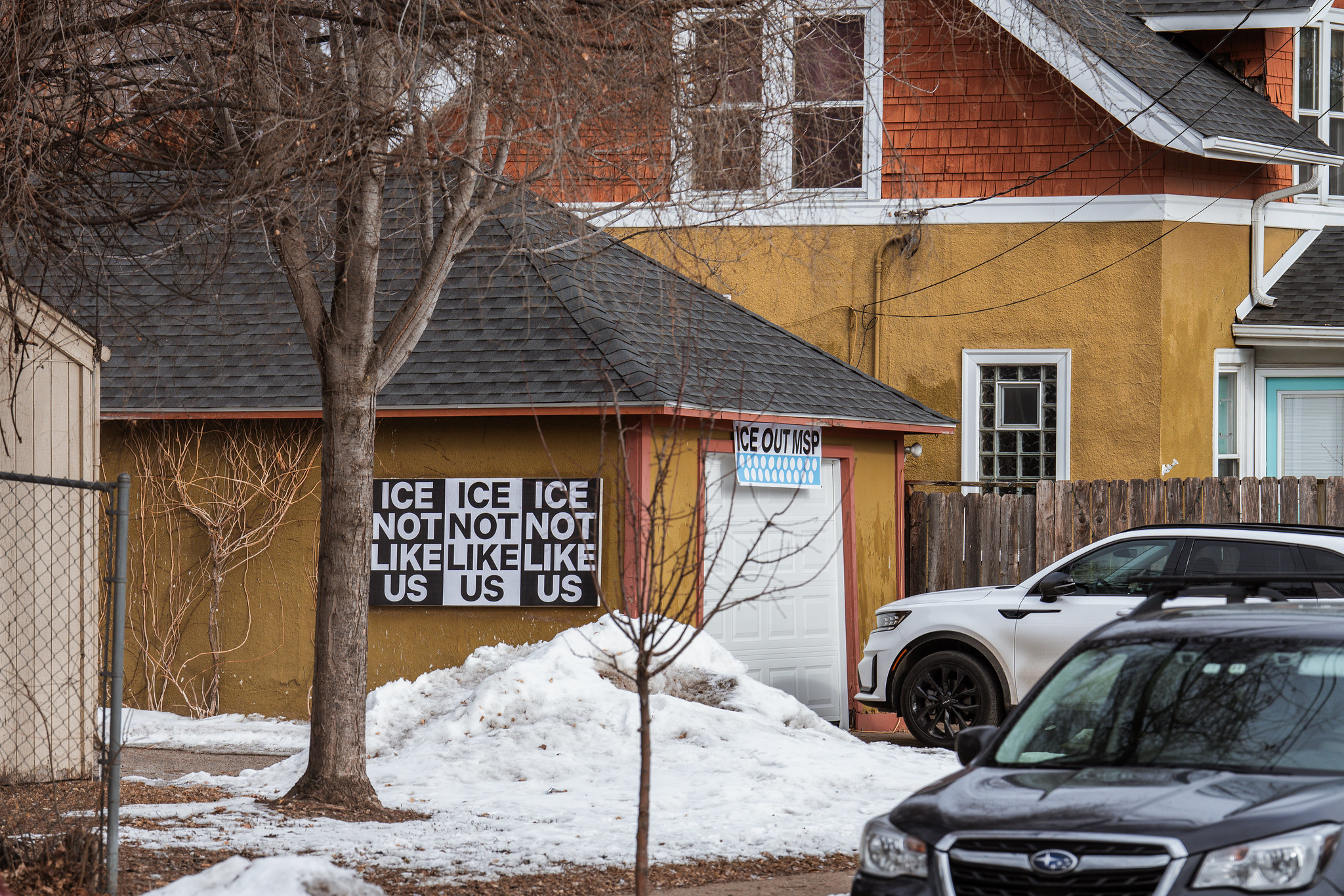As I walk into the airport, two shaggy dogs bound up to the front door and then, pets received, head back to their owner. A group of guys sit around on couches, drinking coffee and shooting the breeze. It’s a sunny Thursday morning here at this small municipal airfield in the Twin Cities suburbs, which I will not identify further for reasons that will soon become obvious.
Andy, a jocular pilot in a blue collared shirt and baseball cap, gently ushers us into a side room of the aviation center and closes the door. It’s nothing personal, he explains, but pilots tend to be a pretty conservative bunch. And we’re here today to discuss Elevated Access, a network of volunteer pilots—like Andy—who fly folks seeking reproductive or gender-affirming care across the United States.
For decades, members of the aviation community have offered “angel flights” to folks who need to travel for medical care, natural disasters, or to escape domestic abuse. Founded in 2022, Illinois-based Elevated Access offers the same service to those who need an abortion or gender-affirming care, at no cost to the passengers.
With reproductive rights under attack in nearby states, more people are traveling to Minnesota for care. The share of out-of-state patients coming here for an abortion tripled between 2020 and 2023; more than one in five abortions in the state in 2023 involved people traveling from other states. Add in Minnesota’s status as a trans refuge, and even more people are coming to the state.
“When the Dobbs thing happened and everyone was talking about, ‘I don’t know what to do,’ I just went on Facebook and asked friends, like, ‘I have an airplane, and I can help people move across the country to get where they need to be,’” Andy recalls. Someone told him about Elevated Access, and he signed up to volunteer.
He’s flown more than a dozen times for the nonprofit over the last few years, helping folks get to appointments in Minnesota. And he’s just one of hundreds of pilots in the network trying to ensure that everyone can access care, even as conservative lawmakers try to make it impossible.
After George Floyd was murdered in 2020, Elevated Access executive director Mike Bonanza and his wife showed up in all the ways that seemed important at the time: donating, voting, protesting.
“We were feeling, like a lot of people, like it wasn’t accomplishing anything,” he says.
As he facilitated and attended workshops about the role white people have in upholding white supremacy, Bonanza started to learn about reproductive justice, the feminist framework developed by Black women that outlines how people should have the right to control their own sexuality, gender, and reproduction.
Reproductive justice is about bodily autonomy, but also the ability to raise children in safe and sustainable communities. And it acknowledges that true reproductive equality is a matter of economics, privilege, and more: “Just because abortion was quote-unquote ‘legal’ in 2021 didn’t mean that people had access to it,” Bonanza explains. He started volunteering with Midwest Access Coalition, which offers practical support for people seeking abortion care, around that time, mostly offering IT, security, and privacy support.
But Bonanza is also a pilot, and he wondered if there was a way to put those skills to work for Midwest Access Coalition. Around the time Texas’s bounty law went into effect, he picked up the coalition’s executive director and a board member from a small business airport on the North Side of Chicago and flew them to a rural airport hundreds of miles away.
“The lights came on, and they saw just how private it is, how convenient it is, and the potential for impact on folks,” he recalls. “They said, ‘You should do this … we’re Midwest, you’re going to be national.’”
The areas where abortion care isn’t available often lack public transportation like buses, trains, and major airports. But, as Elevated Access board member Diana Parker-Kafka told The Guardian in 2023, just about everyone in the country is within a half hour of an air strip where small planes can land—and that’s where these volunteer pilots come in.
Pilots can fly into and out of small airports, even in the middle of nowhere, and make minimal chit-chat with the people staffing that airport or with local air traffic control. They don’t need to file a flight plan or, for the most part, tell anyone where they’re heading; there’s no paper trail for passengers, who don’t have to flash an ID like they would at a commercial airport. And there are thousands of small airports around the country, from the deepest red regions of Texas to the suburbs of the Twin Cities.
Bonanza reasoned that small, private planes flown by discreet, politically aligned pilots could be a big help. Elevated Access completed its first flight in 2022, and things, well, took off very quickly from there.
“Before the Dobbs opinion leaked, it was me and two other pilots,” Bonanza says. “And by the time the actual decision came out at the end of June of ’22, we had over 500 that wanted to join our network.”
Andy was one of those pilots; E., another Minnesota-based pilot, got involved after seeing a few posts in pilot Facebook groups. “It was one of those kinds of things that spread a lot by word of mouth,” she says.
For E., the choice to get involved was easy. “It’s always been an issue that I care about, not just because my best friend has had an abortion, but also because I can’t believe we’re still talking about whether or not women get to make medical decisions about their own bodies,” she says.

“I don’t like bullies, that’s been my motivation,” adds Andy, whose younger brother, born with a cleft lip and palate, was picked on mercilessly. “I always hated that punching-down attitude … why are you picking on someone that’s below you, disadvantaged in some way, shape, or form?”
While there are many groups that organize charity flights for people with medical issues—E., for example, also flies with LifeLine Pilots—there’s nothing else quite like Elevated Access. “It filled a different niche,” she says, one that was “really, really necessary.” Bonanza says those flying into Minnesota via Elevated Access mostly come from the Dakotas (South Dakota is one of a dozen U.S. states that have enacted a total abortion ban) and Montana (especially eastern Montana), with occasional flights from Iowa.
Since its inception, Elevated Access has offered its services to those seeking reproductive health care as well as those seeking gender-affirming care (or relocation to a more LGBTQ+-friendly state). When it comes to reproductive health, Bonanza says, the infrastructure to help people access care is pretty mature. Clinics will ask if patients need funding or practical support, and they can connect them with the orgs that provide it. For the most part, Elevated Access works on a referral basis, with groups like Midwest Access Coalition sending people who need transportation their way.
“For gender-affirming care it’s a lot more complex, just because the attacks on gender-affirming care are so much newer,” Bonanza says. Those referrals might come from health care providers, PFLAG chapters, LGBTQ+ centers, or trans rights orgs. In these situations, EA also offers a self-referral process, though they clarify that its pilots only offer air transportation, not other wraparound services.
But one thing every Elevated Access flight has in common is that its pilots want to make passengers feel safe. Most of the people who fly with the organization have never flown in an airplane before, not even with a commercial airline, Bonanza says. It's very normal for them to be nervous, to share a fear of turbulence or storms or heights.
“The most common denominator, if you will, with people that I’ve flown, is that once we’re onboard and we’re airborne, it’s just a relief,” Bonanza says. “I don’t get any sense that they’re stressed about the care they’re going for. At this point, they’ve already navigated all these different barriers to get to the point that they’re on their way.”
“These are not people going on vacation; they’re having a medical procedure done, which is usually stressful. They’re going away from home, and they’re jumping in an airplane, of all things, with someone they have never met,” E. adds. “They know nothing about me … It strikes me that you’ve got to have a lot of guts to be willing to do that in the first place.”
Even still, she remembers flying a pair of young women who, upon seeing a four-seat piston airplane with a propeller on the front, remarked, “It’s really small!” They ended up having a blast, peppering her with questions about the plane and her experiences as a pilot. Flying is fun—Andy first fell in love with it as a young child, watching Luke Skywalker zipping around in X-wings.
“If we can give people some joy along the way, too, if they find it to be fun and adventurous, then even better,” Bonanza says.
At the outset, Bonanza laughs, Elevated Access didn’t even have a donate button on its website. But attention started rolling in quickly back in 2022 thanks to viral TikToks about the organization’s work, and profiles in Rolling Stone and the Chicago Tribune followed. By the end of that first summer, the nonprofit had become a second full-time job for him—and it had raised enough money that he could quit his day job and focus on it full time.
In Illinois, where he and Elevated Access are based, abortion is legal, but he’s done intrastate flights for folks who can’t locally access the care they need. “There are barriers to getting access to care, and it’s not a red state or blue state problem,” Bonanza says. Sometimes people just don’t have the money to pay for gas or a car that can make the long drive, or the availability to take time off of work for care. Maybe they can’t cover childcare expenses or handle the lost income travel would require. An Elevated Access flight can lessen the burden, turning a multi-day journey into an eight-hour round trip.
Since that first flight in 2022, Elevated Access has grown to a staff of eight people, and its volunteer pilots have completed roughly 3,000 flights. “We’ve flown into, out of, and over every state in the country except for Alaska at this point,” Bonanza says. He still flies people himself, about once a month, in addition to his other work with the organization.
For their own safety and legal protection, Elevated Access pilots are instructed not to ask people the specific reasons they’re flying. Not that it matters to them either way: “I could make assumptions, but I don’t care. The thing is, none of this is any of my business!” E. says. “All I have to do is drive the bus.”
If only the United States government felt the same way. About half of all states now ban or severely restrict abortion, and some advocates worry that those aiding folks who travel for one could face legal repercussions. "You could see an aggressive prosecutor trying to say, under the current laws, that, 'We are going to charge this pilot with being an accessory to murder or an accessory to abortion,'" David Cohen, a law professor at Drexel University, told NPR in 2023. "We haven't seen prosecutors try that yet. But there's good reason to believe that's on the horizon."
It’s an occasional topic of conversation in the Elevated Access chatrooms, but for the most part, E. says, these pilots have a very “come and take it” attitude.
“There’s some people who are worried about it, and there’s a lot more people who are like, ‘Nah, let ‘em try,’” she says. She thinks it’s indicative of how important this work is to people, how much they’re willing to fight. “I think sometimes certain entities in power underestimate how much this matters to people.”






